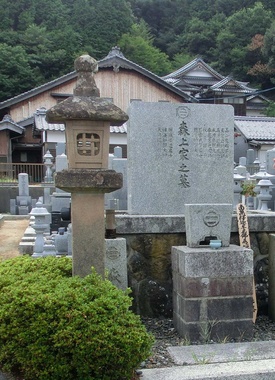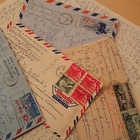Morikami Sukeji traveled to the United States as a member of the Yamato Colony in South Florida, and remained there alone until the end of his life after the colony was disbanded. After the war, Sukeji continued to write letters to his sister-in-law and her family, whose husband (Sukeji's younger brother) had died. Although Sukeji increasingly complained of physical ailments and pain, he continued to work in the fields intermittently, ordering seeds from Japan and so on. At one point, he said he had no energy to read, but perhaps his desire to read was awakened, and he began to order books and magazines from Japan. Unlike previous years, no one came to celebrate his birthday in 1972.
* * * * *
"Even the smallest things make me short of breath"
November 13, 1972
Rei-san, I'm bored and in trouble. Please send me the magazines and books listed below as soon as possible.
"Cheerful" monthly "Center" monthly "Ecstatic Man" by Sawako Ariyoshi Part "Giant Onisaburo Deguchi" by Kyotaro Deguchi Part "Agricultural World" Part "Gardening Japan" Part
Please send it by regular parcel post.
Please ask Takii for a loaf of fresh Japanese black pine (bonsai) seeds, also by air mail.
Rei-san, how are you feeling? It's a noisy world, so don't worry about trivial things. I still can't do anything. Even the smallest things make me exhausted and it's a problem. The 5th (my birthday) was an unforgettable day. It was Sunday, so everyone next door went out fishing in the morning. I could do nothing but lie down and reminisce.
Usually, my close friends would gather to celebrate with me, but over the past year, everyone has died or gotten sick, so no one came. Maybe it's because it's autumn, but my appetite has returned. Prices are still as high as ever. Fortunately, I can get by on most of my vegetables and fruits, so that's a big help. There's a lot I want to say, but I can't bring myself to be as sarcastic as I am, so I'll stop here.
You're a glutton too. Be careful.
I'm sending a few sheets of Japanese airmail letter paper. The old ones cost about 30 cents. Don't forget to put on the deficiency tax.
Some Chinese people nearby have started growing vegetables, apparently for Chinese cuisine.
<I'd like some black pine seeds>
December 26, 1972
Reiko, I've finally received the seed pamphlet, so I'm sending it to you. Please order a loaf of fresh black pine seeds from Takii to be sent immediately by airmail. I'll send the money the day after Christmas. My health is the same as always. I can't do anything. I just stay still. It's been drizzling every day and it's been pretty cold at night. I need a heater. The rest of the magazines I want you to send me are from the following publishers.
"Horticultural Japan" Hakuyu-kai, Shinjuku-ku, Tokyo "Agricultural World" Hakuyu-sha, Shinjuku-ku, Tokyo
If you can't find it in the store, ask the agricultural association.
The other day, two unexpected people came to visit me. One was Murashima-san from Miami, and the other was Yoshizu-san from Washington. It had been ten years since I last saw them, and they both came with their families. They said they had read an article about me in the newspaper. They both brought me lots of Japanese food as souvenirs. Over half of it was something rare that I had never heard of or tasted before. It was like Obon and New Year's came together. I've been enjoying a little bit every day since New Year's.
Murashima-san was born in Hawaii, but grew up in Japan, graduated from a girls' school and a university, and has a third-degree degree in calligraphy. She is a strong woman, but a very gentle person in the Japanese style. She and her son are running a large import, retail, and wholesale business of food products from Asian countries.
Yoshizu-san is working for the government. He seemed surprised that I was living a more miserable life than the article said. The 6th was the first anniversary of Alice's death. I visited her grave with her husband William. I teared up as I remembered her sleeping under the small stone monument. William was also crying. I offered roses, stroked the stone monument and called her name.

The Deadrick family graves are almost full, and only two graves remain. One is for William, and the other is for me. Masahira (my younger brother) built a fine Morikami family grave at Chigenji Temple in Miyazu. The names of our ancestors are carved into it, and he asked me what my name should be. I'm a lonely old man. I've already decided on a cemetery here.
I don't know what lies ahead. A solitary island in the middle of the ocean where no birds fly, an eternal jungle... a dead graveyard. There's no name for it.
Kiyo-san sent me a letter and a few months' worth of the Miyazu newsletter for the first time in a while. She says she is healthy and busy. Above Kamimiyazu Imajuku...Fukatoge Pass...there is a vast mountainside covered with cedars. Since I was a child, I thought that if we cut down the entire mountain and planted ○○, it would become a source of revenue for Miyazu for 100 years. I consulted Masahira-e immediately after the end of the war, but there was no reply.
Whenever I think of my hometown, I think of this mountain. Two years ago, I asked my mother to send me a map of this mountain, but she never sent it. I have asked her to contact the city authorities directly, using the letter from Kiyo as an opportunity. I no longer have any desires or gains, but if I make a full recovery and live to be 100 years old, I would like to do some work.
The flying saucers still fly around. There must be an open world out there somewhere. I will find it someday. I want to know...
It's fine today, but cold. It's almost noon, but the north wind is blowing. I can't stand the cold, and when winter comes, I still prefer the hot summer. Last year around this time, the peach blossoms were in full bloom, but this year, not a single bud is visible.
I don't have any problems with food and I'm not stingy. I just can't bring myself to be extravagant, so I'm a loser, but I can't help it. I'd like to live a more primitive life if possible. Happy New Year. Best regards to everyone. Goodbye.
"There are a lot of people. I have to escape."
February 7, 1973
Thank you for your letter and newspaper clipping, Rei-san. Please send me a copy of each of Modern Agriculture and Agriculture and Gardening. I don't feel any pain if I sit or lie down, but the moment I stand up, my legs go numb. I can't walk more than 10 or 15 steps, and I have no choice but to sit down and rest. I can drive cars and trucks, but it's difficult to go up and down hills.
If I sit down with my hands free, I can do anything, but with modern medicine, doctors and medicines are ineffective. I have no choice but to let things take their natural course, just like with the lung disease of the past. In the English dictionary, "Holiday" means "day off" or "holiday." What is it called in Japan? It's probably "holiday."
I found a fashion book. It's a newspaper and quite a large volume. I asked for it. If one of my friends goes to town today, I'll send it. I'll send VOUGE (a fashion magazine) as soon as I find it. Records are a difficult problem. There are thousands and thousands of records and it's impossible to find them without knowing the original names.
Mikio sent me a photo album of Tenri City. Maybe if I take some time to relax in such a beautiful place, my illness will be cured. There was no reply from Miyazu City Hall regarding the cedar planting. They showed no interest in my direct inquiries that I asked my mother to make. My lifelong memories and plans for a century of my hometown have become a dream. Times have changed. Even a small donation would have received a polite letter of thanks and been published in the newspaper. I even thought I would have been willing to invest most of my assets if necessary. I'm only interested in the present and can't see beyond. It seems I'm just thinking of it as the ramblings of an old man.
No matter how many years I wait, there is nothing I miss more than my hometown. I want to meet you all once. I want to visit your graves. I want to see the trees I planted. This is my dream. I'm old, but I feel young. I'm full of hope. I have a lot of work to do. I have to beat this disease. I've lived a natural life.
Houses are being built one after another. Immigrants are coming in like a flood. They have to escape somewhere. In the north, Canada and Alaska are cold. They are completely uninhabitable. What about tropical South America?
It is the last frontier in the world, the Amazon jungle. It is the home of uncivilized natives. A transcontinental highway is currently under construction. The world's largest river is several thousand miles below the equator. I can't help but get excited as I read the article and look at the map. All I can do now is cure my illness. It's quite cold this morning, but it will be warm in the afternoon. I'm hungry. What should I eat? The smoked beer I was given...? I also have bananas and milk. That's all for today. Goodbye.
These apricots grow quickly. In about 30 years, they will grow to be larger than one's arms. Recently, a new variety was announced. It is said to grow more than twice as fast.
(Titles omitted)
Continued >>
© 2020 Ryusuke Kawai






